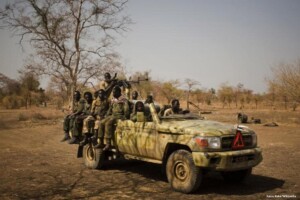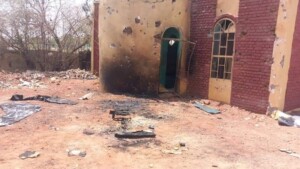Anger as RSF launch mass detention campaign in West Darfur
The Darfur Bar Association and partners reported the detention of at least 197 people by the Rapid Support Forces (RSF) in West Darfur in a campaign that targets tribal leaders who refuse to partake in RSF-led reconciliation efforts and other activists, teachers, students, and farmers. Several people disappeared.
 RSF troops (SUNA)
RSF troops (SUNA)
The Darfur Bar Association and partners reported the detention of at least 197 people by the Rapid Support Forces (RSF) in West Darfur in a campaign that targets tribal leaders who refuse to partake in RSF-led reconciliation efforts and other activists, teachers, students, and farmers. Several people disappeared.
The detentions are still continuing in Azirni, Sirba, Misterei, and other areas in West Darfur. The DBA and partners reported yesterday that more than 197 had been detained so far by the RSF militia whilst an unknown number of people disappeared.
According to information the DBA and partners received from legal and civil sources and relatives of detainees in West Darfur, the detention campaign is targeting activists, teachers, students, and farmers. Tribal leaders were also targeted.
The RSF are continuing “their malicious pursuits of the native administrations leaders who refused to sign their agreement with the RSF Peace Festivals,” the joint statement says, referring to the wave of tribal reconciliation agreements signed under RSF pressure.
'The RSF are continuing their malicious pursuits of the native administrations leaders who refused to sign their agreement with the RSF Peace Festivals' – DBA and partners
These agreements brokered in Darfur by coup-leader, Deputy-Chairman of the Sovereignty Council, and Commander-in-Chief of the infamous RSF, Mohamed Hamdan ‘Hemeti’ Dagalo, have been criticised as being ‘superficial’ and as not representing the interests of the people.
They “will not to real stability in Darfur”, said a leader of the Communist Party of Sudan, member of the Darfur Bar Association, and human rights lawyer Saleh Mahmoud last month.
Tribal leaders detained
The DBA reported the detention of the Iringa tribe prince Azhari Ahmed Sanousi on Tuesday as he refused to join the ‘tribal reconciliation festivals’ organised by the Peace and Tribal Reconciliation Committee headed by the Rapid Support Forces in West Darfur.
The statement explained that 27 native administration leaders, headed by now-detained Prince Sanousi, have withdrawn from the West Darfur Peace and Tribal Reconciliation Committee.
In Sirba locality, roughly 15 native administration leaders announced their withdrawal from West Darfur Peace and Tribal Reconciliation Committee.
In a statement received by Sudan Tribune, the civil leaders justified the withdrawal by explaining that they were not included in the meetings held by the committee and citing the lack of neutral parties to negotiate between the conflicting parties to formulate an agreement that meets the hopes and aspirations of everyone.
Many of the RSF members have been recruited from Darfuri Arab herding tribes involved in recent violence. Hence, they are not seen as an impartial presence by many of the tribes that were targeted by herders’ attacks.
Darfur has a long history of strife between Arab herding tribes and non-Arab African herders or sedentary farmers. Arab tribesmen were recruited by the previous regime of dictator Omar Al Bashir to join the Janjaweed militias. Al Bashir employed these Arab militias to repress a revolt over ethnic marginalisation in the region, mainly targeting non-Arab African farmers in what became known as the Darfur Genocide.
The DBA and partners call for the immediate release of Sanousi and the other detainees and called for a stop to the ongoing detention campaign against the people who are against the “fake reconciliation documents of the RSF”.
“What is currently happening in West Darfur under the cover of so-called reconciliations between tribes, is only a manifestation of using tribal groups for political purposes and the squandering of state resources for purposes that set communities against each other”.
The association further states that the head of the West Darfur Peace and Tribal Reconciliation Committee, RSF Col Mousa Ambeilo, is responsible for “committing grave crimes in the region, including crimes against humanity”.
'[The head of the RSF-led tribal reconciliation committee] is responsible for committing grave crimes in the region, including crimes against humanity'
Continuing violations
The Sudan Tribune reported that tribal leaders in Sirba highlighted the continuation of attacks by militiamen, which witnessed a bloody conflict recently, leaving large numbers of dead and wounded and thousands of displaced people.
A prominent leader of the Gimir tribe, Abakar El Tom, told Sudan Tribune that since the signing of the reconciliation agreement, Arab tribes have violated the agreement at least 36 times when they were involved in cattle rustling. Request to set up a committee of inquiry into the cattle thefts were ignored by the RSF.
El Tom said that dozens Gimir were held at the beginning of this week, including 38 students and teachers, in addition to medical staff. Many of them were taken from their farms and deported to Port Sudan Prison.
The Gimir were recently targeted in a violent conflict that erupted following a dispute over land ownership between a Gimir man, a non-Arab African tribe, and a Rizeigat man, an Arab herding tribe. At least 125 people were killed, of which at least 101 were from the Gimir tribe.
Military govt responsible
The Darfur lawyers hold the military government responsible for the chaos in the country.
“The detentions are due to the absence of any programme for the management of the country and the deliberate absence of a clear role for civil and justice institutions and the agencies entrusted with implementing the provisions of the law and maintaining security and the safety of society”, the statement read.
“The decision-making centres in the country multiplied, and a culture of superficial decisions based on tribal principles and impunity prevails,” they state in response to current developments in West Darfur where “superficial reconciliation agreements [are signed that] do not address the real problems between the local communities and only serve the self-powerful ambitions of certain individuals and groups”, referring to the RSF and Arab herding tribes in Darfur.
'Superficial reconciliation agreements do not address the real problems between the local communities'
RSF position
The position of the RSF in Darfur is highly contentious. The RSF was established by the Al Bashir regime in August 2013 and grew out of the janjaweed militias which fought for the Sudanese government in Darfur since the war broke out in 2003 and were largely made up of Arab herding tribes. The Janjaweed are held responsible for the genocide against Darfuri farmers and other non-Arab/African groups.
The RSF is widely believed to be responsible for atrocities in the Kordofan and Darfur regions in the past years and is also widely condemned for their role in the October 25 military coup and subsequent violence against pro-democracy protesters.









 and then
and then